Now that I only use this blog to post these lists instead of writing on it all the time, I find that the TV list comes more down to "shows I want to write about" than "shows I objectively think are the best". At least, this is what sticks out to me when I look back on the year of television. It's what I really remember watching.
Best of 2014
9. Tim & Eric's Bedtime Stories (Adult Swim)

Tim and Eric have always been halfway between bizarre sketch comedy and some sort of horrible David Lynchian nightmare, so it was fun to watch them embrace that second aspect of their work. Some episodes of Bedtime Stories don't even have jokes at all, focusing instead on dark (but still oddball enough to obliquely be considered comedy) story concepts in a Twilight Zone sort of way. Other episodes are just straight comedy, and it's best to think of it as them applying their style to slightly longer-form television and really seeing where their minds will take them. It's often not a very nice place.
8. Doctor Who (BBC)

I was looking forward to seeing the first "old" Doctor of the new series, and I was not disappointed. It's Doctor Who, so of course there's some weak episodes, and I was a bit put off by the Doctor's new habit of insulting his companion Clara's appearance. But that character became a real strength for the show this year as her relationship to the Doctor changed significantly as a result of his regeneration, and her courtship with new character Danny Pink was also a huge asset. After they got on a roll, the show had a string of episodes as strong as anything I've seen the series do, and I liked the renewed focus on good individual stories over convoluted season-long plots that never end up anywhere good. I'm looking forward to more adventures through space and time.
7. Community (NBC)
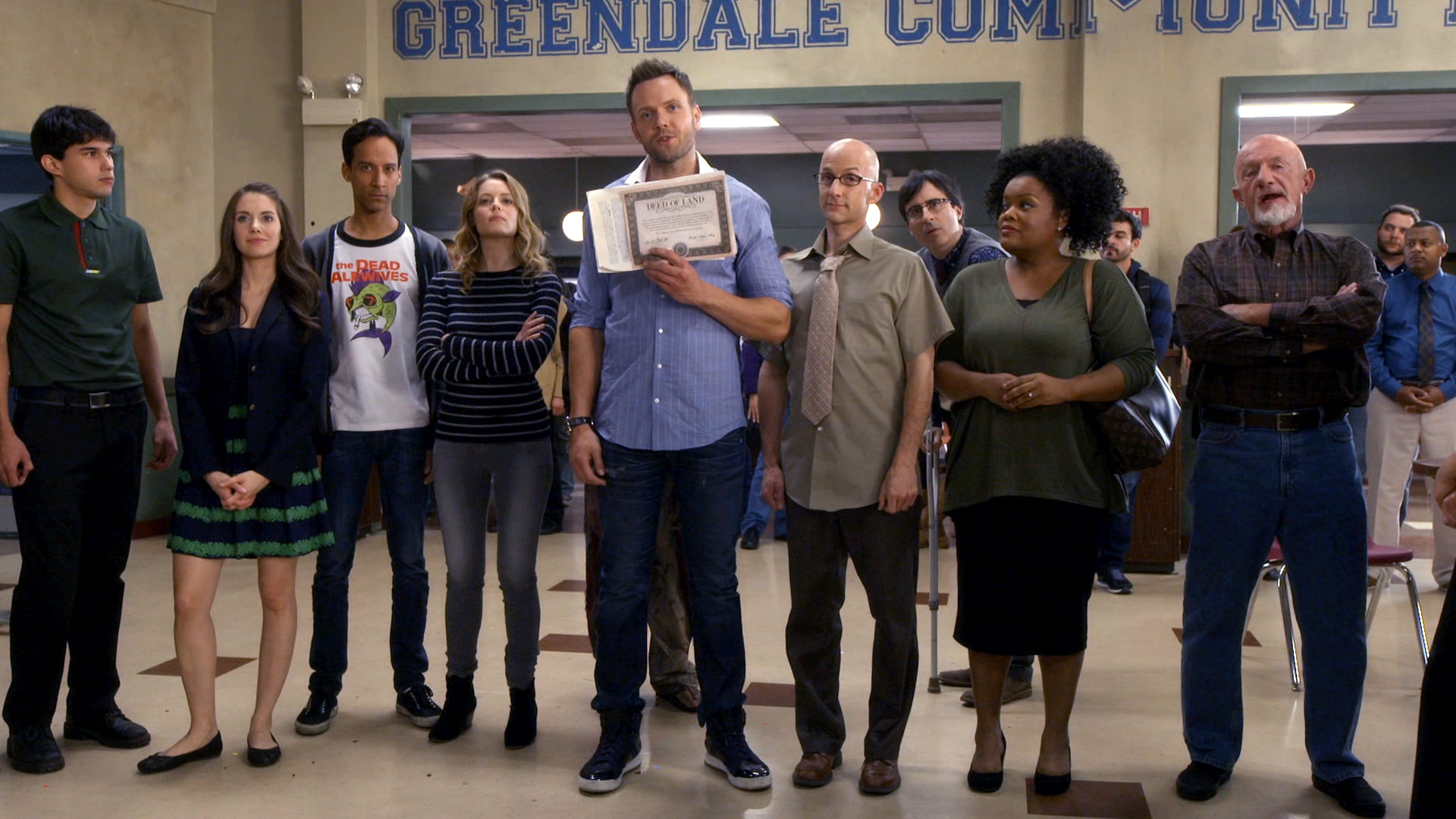
I don't know if Community truly belongs up here, but just the fact that they took a show that was basically dead, brought back the original creator, lost two main cast members, and ended up with something that didn't suck, that was actually quite good, is pretty amazing. It's not up to the heights of the first three seasons at their best, but damn it, it was Community again. We'll see how the new season on Yahoo works out, but I'll always remember what they pulled off in their last year on NBC.
6. The Legend of Korra (Nick)
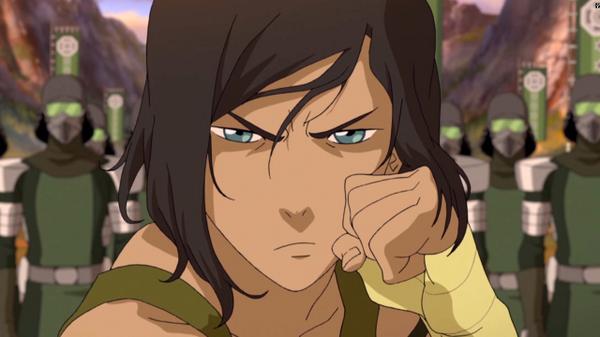
Despite weird manipulations and bumbling by Nickelodeon, the crew of one of the best animated action series in years managed to put out not one, but two seasons of their follow-up to Avatar: The Last Airbender in 2014. They were the better two seasons of the show, up there with the best in the whole franchise, and a great way to say goodbye to this setting, if that's what we end up doing. Korra's central characters are older than Avatar's, and that comes through in the story, which is ultimately a more mature tale about growing up and learning you have to face your own troubles before you are able to help others, and that kicking someone's ass isn't always the answer. Not that kicking ass doesn't work once in a while, as the action scenes in these two seasons are up there with anything you'll ever see on TV. It's also great to see a prominent same-sex romantic relationship come to pass in something kids might see.
5. Cosmos: A Spacetime Odyssey (FOX)

I'm afraid Neil deGrasse Tyson will become too big for his own good. He's a great ambassador for the value and wonder of science, but he doesn't know everything, and sometimes it seems like he thinks he does. His talents are perfect for Cosmos though, his homage and successor to his mentor Carl Sagan's old series about all the wonders of molecules, galaxies, and everything in between. A lot of what you'll learn in Cosmos is stuff all adults should probably know already, but the fact that Tyson and his crew are still bringing people that information in a smart and accessible way is great, and I love how they directly confront some of the bigger human obstacles in the way of progress. At its best, Cosmos captures the awe and wonder I feel at the real size and possibility of the universe and humanity's future in it, and I think it should be required viewing for anyone with the smallest curiosity about life as we know it.
4. Boardwalk Empire (HBO)

The sense of history in Empire's final season is inescapable, as it closes in on some people, opens up possibilities for others, and brings ultimate closure to far too many. They only got eight episodes and had to skip past several years of juicy gangster dealings, but I feel like we ultimately got everything we needed. Empire isn't quite the epic of crime, family, and politics it wanted to be, but it did an admirable job of working with what it had and providing some great characters and unforgettable moments. A great deal of those moments involve people getting shot in the face, but a lot of times that's how these things went.
3. Game of Thrones (HBO)

A Storm of Swords is my favorite book in the series, and the fourth season of the show mostly adapted its second half, so of course I liked it a lot. However, they also showed a greater ability to change and shift characters and stories around where needed, which is great, because they're going to need it as they go forward into the more recent books. Not every change totally worked, especially one unfortunate sort-of-rape scene that came off worse than the original material, but on a more general level, they're doing a great job of turning a humongous epic into a manageable episodic story, without really making it feel any smaller. One of the most purely enjoyable shows to just watch from week to week.
2. True Detective (HBO)

Coming right in the middle of the McConaughey renaissance (the McConaissance), True Detective used his and Woody Harrelson's skills to their full extent to craft a great, haunting Gothic-noir-mystery-detective THING that defied easy definition and got at the heart of the struggle between good and evil. It covers years of an investigation into a series of strange killings in Louisiana that end up getting connected with a chain of Christian schools, references to an obscure forgotten city (which got me and many others to read The King in Yellow), and a whole lot of problems for the two leads. It will be hard for the unrelated second season to recapture the magic of the first, but we'll always have the lead performances, Cary Fukunaga's great direction, and the flat circle of time to think about.
1. Rick and Morty (Adult Swim)

Rick and Morty is a show about a brilliant old man with a drinking problem who brings his simple-minded but good-hearted grandson with him on trips to other dimensions for various ends which usually end up only serving him. That right there is enough for a good Adult Swim show, but Rick and Morty is definitely something more, already on the same level in my estimation as The Venture Bros. and possibly higher. There's a ton of imagination in every single episode. It will surprise you with story resolutions that are more disturbing than what they could easily get away with, and then follow that up by turning it into something that really profoundly affects the characters. It's sometimes a story about a failing marriage, and mines that for real emotion rather than simple laughs. It's also extremely funny every single week. I laughed out loud multiple times in every episode. That just doesn't happen, you know?
Delayed Entry
This is the best show that didn't air in 2014 but I didn't watch until then.
Prime Suspect (BBC)
The gritty British detective drama that I assume is the basis for the DNA of every British detective drama that followed. Over the course of over a decade, Helen Mirren played Detective Jane Tennison, one of the best realized characters in television. She's a brilliant detective, but also a flawed one; a good person, but also a flawed one. We see the arc of her career in a way you usually don't in a TV show, and along the way she investigates some truly unsettling and cleverly twisty crimes. The double length format is a bit of a slog at times, but if you watch Prime Suspect you watch the maturation of television as a medium. There aren't usually easy answers.
Thursday, January 15, 2015
Best Shows of 2014
Thursday, January 16, 2014
Best Shows of 2013
The list of shows I watch has slowly dwindled in size as many series have been ending while I've been slower to add new ones. Combine that with a few previously excellent series taking dips in quality, and 2013 wasn't the best year for TV in a while. Still, everything on this list kept me thoroughly entertained and engrossed.
Best of 2013
8. Treme (HBO)
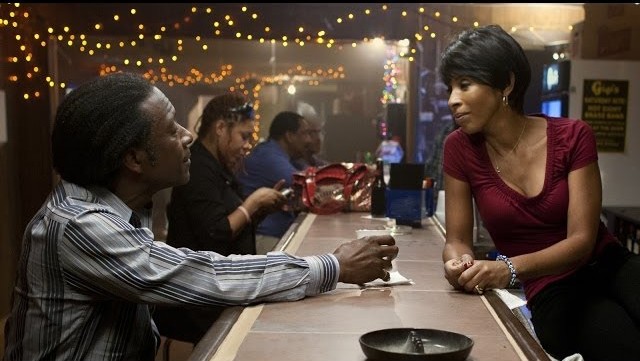
There were multiple shows that ended in 2013 in ways that drove home their themes and big ideas gracefully, like 30 Rock and Spartacus, and Treme was one of the better ones. The show has never gotten a fair chance from a lot of people because it wasn't and never could be as propulsive as The Wire, but it's still a completely effective drama that shows how a city stuck in a horrible situation worked to pull itself together, and that there's still a lot of work to be done. There's only five episodes to this fourth and final season, but they're among the best five in the show's whole run.
7. The Venture Bros. (Adult Swim)

Even including last Halloween's special episode, the fifth season of The Venture Bros. was only around for five hours. Still, Doc and Jackson once again proved they're making the best animated series on television. I just know there will be enough of it. Every new direction they go in reveals even more history and interesting new characters, and there just isn't enough time in the world for two guys to get every last drop of fun they could out of it. All this while it's amazing how much they usually manage to cram into about 22 minutes of air time. The hour-long premiere essentially feels wasteful for not getting its story across in half that time. I like The Venture Bros., is what I'm saying.
6. Parks and Recreation (NBC)

It might be because I don't watch enough new shows, but I think Parks is still the best comedy on TV right now. The entire cast is full to the brim with talent and clearly enjoys working with each other, as they constantly find new spins on old relationships and hidden details that delight when discovered. "Leslie works in the council" might not be quite as compelling a throughline as "Leslie runs for council", but they still find a lot of ways to poke fun at modern politics and get some solid bits of comedy and real meaning out of the concept. I'm still not sure when the show's ending, and I have the feeling it might be soon. If that's true, I'm glad to keep watching it while it lasts.
5. Mad Men (AMC)

It's only through association with the dazzling fifth season that the sixth seems a little disappointing in comparison. But while I'm glad the show is finding out where it wants to go and extremely perturbed by the decision to chop its final season into two halves, I'm still really enjoying it while it's on. Great writing, great acting, great humor, and plenty of surprises still left with unexpected plot shifts and an unending supply of new layers to discover in the characters.
4. Justified (FX)

I like how each season of Justified is able to develop its own unique little personality while still fitting into the grander ideas at work in developing one of the most fascinating depictions of crime and law in modern television. Justified was more subdued in 2013 than it was in 2012, slowly building a D. B. Cooper-esque mystery while a web of danger and suspicion wraps tighter and tighter around those in the center. It's the kind of season you can only get after a few years of buildup, as all the pain in these characters pasts comes back even stronger for some of the show's very finest moments. It might be the show's best, when all is said and done.
3. Boardwalk Empire (HBO)

While Nucky is still Boardwalk's closest thing to a central figure, season 4 was definitely all about the supporting cast. Chalky White, Richard Harrow, and the entire Chicago subplot got a lot of focus this time around, and it was generally to tremendous effect. The Al Capone scenes have always had a certain weight behind them because he's probably the show's best known real-life figure, and there was a lot of strong moments as his life as one of America's most infamous criminals began to really get going. It looks like we won't be seeing a lot of that though, because HBO's announced that the fifth season later this year will be the show's last. It's surprising, because the show is still so good and there's a lot from the period they haven't gotten bored with. And a lot of what happened this year was among the most gripping and tragic stuff I've seen in crime television. They've still got it, and they want to end things when they're still riding high.
2. Game of Thrones (HBO)

I mentioned before that this season would be adapting (a large part of) my favorite book in the series, and I was excited to see them depicted on screen. And good lord did they ever pull it off. One scene in particular made history with the impact it had on unfamiliar viewers, especially on social media, and besides it being one of my favorite moments in the pop meta-culture of the year, it was just a damn good scene, getting everything right it needed to to match the feeling of reading it for the first time. And while it's great that they're nailing the big plot points that every fan of the books knows, it's also great that the show totally works on its own too, looking at the continuing warm reception from almost everyone who sees it. Not everything was great - the Theon scenes kind of went nowhere a lot, and the very end of the season finale was dull after the exciting cliffhangers in the first two seasons. But it was still one of my favorite things to watch last year.
1. Breaking Bad (AMC)

Well of course this was going to be at the top of my list. How could it not be? It's the final fucking season of Breaking fucking Bad. Possibly the best final season of a great show ever made. The writers wrote! The directors directed! The actors acted! The cinematographers cinematographied! I actually wouldn't have minded an ending that was a bit more daring and unexpected, but once in a great while, what a story needs and what the audience wants to see actually kind of line up, and it works out for everyone. I'll always remember Breaking Bad for its dark humor, its electric cast, its razor-sharp tension, and the utterly human drama at the heart of it all. One of the all-time greats.
Delayed Entry
This is the best show that didn't air in 2013 but I didn't watch until then.
The Thick of It (BBC)
The Thick of It is probably the most realistic depiction of modern politics ever seen on television while being devastatingly funny the entire time. The casts rotates a bit but is generally pretty solid, and they play a group of people who hate each other, hate the government opposition, hate the citizens of Britain, and basically hate everything else while they're at it. Almost every episode is about some stupid crisis about nothing that shouldn't be happening snowballing into even worse scandal as their sorry attempts to cover it up or apologize get ruined by even stupider mistakes. It's like a symphony of human garbage. I watched it because one of the regulars, Peter Capaldi, is the new star of Doctor Who. I think it's brilliant casting - just replace the caustic Scottish foulmouthed wit with caustic Scottish sci-fi gibbering and you're pretty much there.
Monday, January 30, 2012
Fawlty Towers

Fawlty Towers is a sitcom co-written by and starring John Cleese as Basil Fawlty, the eccentric and put-upon owner of a small hotel in England. Coming not long after Monty Python's Flying Circus wrapped up, it's kind of surprising how standard a show it is, but it manages to be very funny regardless, and with him playing so many small parts while working as a member of Monty Python, it's hard not to say Fawlty is the best character Cleese ever played. The show takes place almost entirely inside the hotel, and the plots revolve around the mishaps and misunderstandings that seem to occur on a daily basis, as Fawlty butts heads with his wife, his dimwitted Spanish waiter, and the various guests who rent rooms. Other recurring characters include a couple older longterm renters with a few running jokes and Polly, a part-time assissant played by Cleese's writing partner and then-wife Connie Booth, but who doesn't do much besides occasionally help Fawlty with his elaborate attempts to conceal problems from his guests and his wife.
The show is a little hit and miss, because while it's almost always funny, some of the episodes revolved around plot ideas that are fundamentally frustrating for a viewer. I realize that it's sitcom convention for small lies to balloon into big ones very quickly, but when the small lie that starts things off seems unnecessary in the first place, it can lead to a whole storyline being irritating to watch even while the individual gags can still be quite funny. The best parts of the show are when Fawlty is matched up against a guest who happens to be a huge pain in the ass to begin with, and the comedy comes from both his befuddlement and abrasive rudeness in response. Things usually escalate in a remarkably madcap fashion, often ending in complete chaos at the end of the episode. The best one was probably the finale of the first season, which begins with Basil running the place by himself while his wife is in the hospital and ends with him trying to do the same while heavily concussed and failing to avoid upsetting a group of German guests. I don't think anyone will ever call Fawlty Towers much of an innovative show, but that doesn't prevent it from still being wonderfully entertaining and laugh-out-loud funny over 30 years later.
Sunday, October 2, 2011
Doctor Who - Season 6

I'm still not totally sure on how I feel about the Steven Moffat era of Doctor Who. The show is still written consistently better than it was during the Russell T. Davies run, and Matt Smith is definitely my favorite Doctor of the three I know. But I'm also not sure about his grand plan for the show. Not only does the show have a more persistent running storyline each season, it's pretty clear that he has one big story that he's taking years to tell. And while that's fine for some shows, I'm not sure it's really the best thing for this one. I like Doctor Who when I have no idea what's going to happen next. Is he going to discover something sinister happening on a seemingly benign alien planet? Is he going to get trapped with a bunch of scientists on some remote research station? Is he going to bump into a noteworthy figure from Earth's past and figure out what weird thing inspired their work? That element of surprise and the feeling that anything could happen is still there in the show, because only a handful of episodes each year dedicate more than a few minutes to the ongoing plot. But just the idea of there being a single story driving the 11th Doctor's entire existence seems anti-Who to me.
At least the story is fairly interesting. It involves the fate of the universe of course, as every major Who storyline does. It also involves his current companions, Amy and Rory; River Song, the fellow time traveler he met back in season 4; and a creepy conspiracy involving a sinister group that's out to get him for some reason. It's a bit too reliant on using time travel as a crutch, both an explanation for and a solution to every problem, though it's kind of hard to complain that a show like this uses a lot of 11th hour gimmicks and cop outs to resolve the ridiculous situations that arise. I just hope it ends up being worth it. It's a fun show to watch, but Doctor Who has a long history of conclusions that seem disappointing next to all of the events that build up to them.
In terms of this year's actual episodes, I don't think they were as a whole really stronger than last year's, though I thought there were definite high points. For one thing, having an episode titled "Let's Kill Hitler" is fun, even if that's not really what it's about. The two part season-opener introduced a great new Who monster in a similar vein to the Weeping Angels; creepy aliens called the Silence, who you forget everything about the second you can't see them anymore. "The Doctor's Wife", written by Neil Gaiman, is one of the show's great one-offs; a story about the TARDIS taking the form of a woman, and finally getting a chance to talk to the Doctor face to face. The second half went on a nice little horror kick, with a couple effectively creepy, well directed episodes that had a lot of fun with the spookier side of the show. As far as Who finales go, this year's was pretty acceptable. It was kind of just a bunch of crap getting thrown at a wall, and some weird choices were made, but at least I have a much better idea of where everything is going, and some weird loose ends were tied off. The next season of Who won't begin until next fall, and it won't end until 2013. But at least there's the annual Christmas special to look forward to.
Tuesday, September 27, 2011
Top Gear - Season 17

I'm not really sure why I keep writing about this show. I guess it's just because I write about every show I watch regularly. But Top Gear is unusual, because it's the only non-fiction series on that list. Well, some of the situations and gags are definitely made up. But it's a talk show. It stars personalities rather than characters, and is based on repeatable segments rather than a narrative. This is all a long winded way of saying there's not much new to say about it after every mostly-biannual series of a half dozen or so new episodes. But I keep at it because that's what I do, I guess. I had fun with these six episodes, as could be predicted. The guests were mostly a wash besides Rowan Atkinson. There weren't really any extended sequences that I loved as much as some previous ones, but setups like the makeshift car-and-trailer trains and trying to demolish houses were entertaining. Richard got to drive a pretty cool tanky jeepy thing. He also did a really nice piece about amputee soldiers who formed a rally team. The guys had fun at each others' expense. It was Top Gear, really. Not much else to say, but I'll keep saying it until that changes.
Monday, September 19, 2011
Saxondale

Saxondale only lasted for a couple brief seasons a few years ago, so I don't think many people have ever heard of it. My only exposure was in an interview with star Steve Coogan on Top Gear, which featured a clip from an episode featuring a character who was obviously based off Jeremy Clarkson. And the show is about to disappear from Netflix streaming (I don't even want to talk about today's Qwikster announcement), so even fewer people will have the opportunity to be exposed to it. Which is a shame, because while the show is a bit too slight to be truly great, it does feature one of the best characters I've ever seen in a comedy. Coogan plays Tom Saxondale, an aging pest controller who used to be a roadie for bands like The Who and Deep Purple (but not Led Zeppelin) and now bides his time as best he can. He has a pretty simple life, living with his heavyset girlfriend Magz and his teenage assistant Raymond, trading barbs with the agency rep who gets him extermination jobs, and going to anger management classes.
It's a pretty basic sitcom, with Tommy occasionally getting into trouble or delicate situations and having to work his way out of them. What's remarkable about it is just the character, who's a perfect storm of performance, writing, and makeup. The character is a complete transformation from Coogan's regular look, and it's well worth watching the show just to see what they do with it. Tommy is kind of a dick most of the time, often handling adversity poorly and feeling the need to control every conversation he's in. He's remarkably well-read and eloquent despite his appearance, but that just increases the know-it-all douchiness he frequently projects. At his core Tommy is still a good guy, though. He's faithful to Magz, he tries to use his authority properly when he has it, and he gets along well with people who don't annoy him, or who he doesn't annoy too much. It's the difficult balance between being a funny jerk and still being a likable person that the show usually nails, and makes the character so intriguing. There's only 13 episodes, but that just might be the right amount of exposure to the character. More shows should explore their concepts as well as Saxondale does without coming close to wearing out their welcome.
Sunday, September 11, 2011
Torchwood: Miracle Day
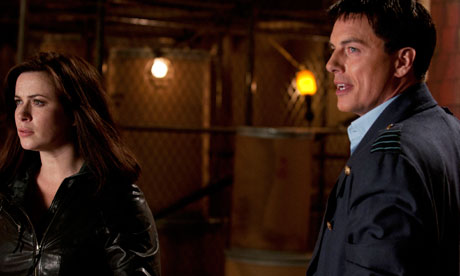
The two regular seasons of Torchwood were pretty weak. The shortened Torchwood: Children of Earth miniseries was pretty good. The question was which direction Miracle Day would lean, as it has the former's longer length but the latter's singular focus on one idea. Unfortunately, it tended toward the weak side of the scale. Miracle Day either didn't take the right lessons from Children of Earth or just didn't apply them correctly, because while I thought it started off pretty strong, it couldn't sustain itself, and I had completely lost interest by the time it ended. It really should have been another five episode run. There just isn't enough story here to justify it being ten hours, and it's all the worse for being stretched out.
The concept is intriguing enough. One day, death basically turns off, and while people can still be crushed and maimed and weakened by disease, their bodies just won't die. Torchwood, or the two surviving members of it, get involved when they receive a message at the exact moment of the "miracle", a message that the CIA detects, causing two agents named Rex and Esther to pursue them. The four team up to figure out what caused the miracle and why, and there's also a completely terrible, nonsensical subplot that ultimately goes nowhere featuring a creepy pedophile murderer played by Bill Pullman whose execution is aborted by the miracle and somehow becomes a popular public speaker for a while.
The show works early because it looks at what would happen if death stopped happening. Hospitals fill up, disease begins to spread like wildfire, doomsday cults form, and quickly the global economy collapses. Procedures and policies that function because death exists break down and have to be rethought. It's interesting stuff, but it gets pushed aside once Torchwood gets a whiff of what's behind it. They quickly learn that a certain pharmaceutical company had stocked up medication for just such an emergency, and must be involved in whatever plot caused the change. They eventually figure out the real truth, which is pretty silly, doesn't capitalize on the concept of death disappearing, and revolves around Jack's two key characteristics - his immortality (which disappears after the miracle) and his willingness to have sex with anyone (which doesn't).
The final answers to the show's question are not satisfying, and the journey to get there is too padded and dull to make that an irrelevant complaint. The new characters don't contribute much either. Pullman's Oswald, as I said, makes no sense. Rex is too much of an asshole on the asshole-rogue scale, and Esther is cute but not much else. The show really doesn't do much with its transition to America, honestly. There's one pretty good for TV action scene in the premiere, and they make a few easy jokes about how the US and the UK are different, but that about covers it. The CIA is also amazingly inept and inconsequential to the plot, with its only success being the introduction of John de Lancie as one of Rex' higher-ups a little too late.
The plot is meandering, with most episodes struggling to stretch themselves to over fifty minutes and too much time wasted before any real information actually gets exposed. It's just a textbook example of how to sully a neat science fiction concept in a television show. I'm not sure if Starz plans to renew their collaboration with the BBC on this, and I'm not sure I care either way. And I definitely hope they don't follow through on their threat in the finale of returning to the same idea.
Thursday, April 14, 2011
MI-5 - Season 9

This recently popped up on Netflix' instant watch service, which is as far as I know the only way it's currently available in the United States. These eight episodes aired as the ninth series of Spooks on the BBC last Fall, and I'm pretty sure this is easily the quickest the show has ever been brought over here. Maybe being on Netflix has helped the series gain a bit of popularity, which has done well enough in its home country, but never caught on much here when they tried. It's still a solid series after nine years, though the speculation that the tenth series might be the final one isn't exactly bumming me out. I've seen 80 episodes at this point, and they've rarely if ever been bad, but after a certain point you've done so many different stories that continuing doesn't have the same excitement anymore. This ninth series tackled the one obvious spy story type that they hadn't really done yet, and it did it well enough that I've now seen pretty much everything I could have wanted to see out of a British spy show.
It might be a bit of a spoiler, but that story type is of the agent going rogue. They've had supporting characters betray the others before, but this is the first time they've really had a central figure end up playing the antagonist role in a significant storyline. Usually in these kinds of plots the spy going rogue is still the good guy, working against a system that's doing the wrong thing, but I liked how this time they pretty much just have them betraying their country for essentially selfish reasons. They were coerced into the betrayal, sure, but in a way that wouldn't have happened if they hadn't turned out to have a pretty sordid back story. The plot didn't totally work because it sort of seemed to ignore the entire previous season's development of the character's past and love life to serve its own purpose, but it still ended up being an exciting and somewhat heart wrenching tale. The rest of the season was fine as well, not exactly unique in the show's run but good enough as far as twisty plots and solid action. The reintroduction of the tension between Harry and Ruth was well handled also, and I find myself wondering if they can manage to get through the possibly final tenth season without one of them ending up like pretty much every other main character in the show's history. You know, dead.
Sunday, April 10, 2011
Merlin - Season 3

In a way it's amazing how consistently Merlin manages to squander any potential it has to be an exciting show. So many good ideas wasted by sloppy plotting or overacting in search of comedy or absolutely atrocious computer effects or just not taking things as far as they should go. And most essentially, the central premise is just beyond annoying at this point. If you're doing a hidden identity story where the main character has a secret no one can know, and it's still a secret to your second most important character after three seasons, you're doing it wrong. People finding out shocking things about someone who's been close to them for years? That's good drama. Merlin saving Arthur's ass with magic but covering it up somehow, resulting in Arthur making a snide comment about Merlin's uselessness for the umpteenth time? That's extremely boring.
The whole anti-magic thing just makes for an eternally frustrating series. Interesting ideas could be explored by having something as potentially devastating as magic be outlawed, and having good and bad people on both sides of that line, but all it results in on this show is alternating between stories of Uther punishing innocent people because they use magic and stories of evil people using magic to punish Uther for punishing innocent people because they use magic. Much like Star Wars: The Clone Wars, it's hard to enjoy storylines where the main characters try desperately to save an authority figure who is essentially a bad person, and whose death would ultimately push the whole plot forward in an intriguing direction (or in Clone Wars' case, stop the third through sixth movies from happening). There are hints that the fourth season might move away from Uther as the ultimate power in the series, but since I won't be watching it, I don't care about those baby steps.
And with every good thing the show does, you have to take a couple bad things with it. Finally establishing Morgana as a real villain is good. But the way she operates through the entire season is extremely irritating, manipulating events and then overly obviously smiling evilly in front of people when their lives are going horribly, and the whole dynamic where neither she nor Merlin will reveal the truth about the other is one of the most boring and nonsensical stalemates I've ever seen. I don't want to be too hard on the show, because I can see why someone would still like it after everything that's happened. At its heart, it's a simple, family-friendly fantasy adventure with a couple laughs and maybe an interesting idea or two every week. It's just not my kind of series - the plots are simplistic and inconsistent, the characters are static, and there simply hasn't been nearly enough progress in three years to keep my interest. The occasional nods to recognizable Arthurian legend come off as only there to remind people that this is somewhat, loosely, vaguely, occasionally based on it, and it has this weird issue where whoever happens to be taking the lead role in an episode comes off as less interesting than they do in a supporting capacity. I still don't hate it, but I've definitely had enough of Merlin and Arthur's faces at this point to safely call it quits without losing any sleep.
Thursday, March 17, 2011
MI-5 - Seasons 5-8

I'm finally caught up with this show, as far as America is concerned anyway. A ninth season already aired on the BBC, and that should be coming over some time soon. And it's still pretty good! It's gotten a bit silly in places, because there's really only so many realistic terrorist threats you can do before your writing staff gets a bit bored and decides something a bit too far from what might actually happen would be a great idea. The show's gritty, simple nature is what attracted me to it in the first place, and while it's become more of a typical Hollywood-style spy thriller since then, they at least haven't gone fully overboard like say, 24 did. The lack of serialized storytelling might have helped them keep it contained, although they dabbled a lot more in that area in these four seasons, especially in season six, which was almost entirely based around a continuous struggle between Britain and Iran over the latter's attempts to become a nuclear power. It generally plays like a typical season where each episode is its own caper, except they all deal with the next natural step in that conflict. It worked pretty well, and while the next two seasons plots were both weaker in terms of plausibility and execution, it shows a definite switch in focus on continuity besides just regularly killing off and introducing new characters.
They haven't stopped that at all by the way, with Harry remaining the sole character to ever stick around for more than four seasons before having to disappear or dying on the job. It's almost depressing watching these people knowing that the odds are their lives will be destroyed within the next couple years, and while it was fun to see a character actually return from exile for once, it just increases the odds she's going to die anyway. I guess it's sort of a conundrum, one that I've mentioned before but deserves to be again. The fact that any of the characters could so easily die in any episode makes the stakes always high... but the fact that characters dies so often makes it hard to allow yourself to care about them... and if you don't care about them, it doesn't matter how high the stakes are. It's not a major problem yet, it's just a curious situation.
I'd also just like to mention some of the less plausible stuff that's been popping up more. In addition to the people protecting a whole country from outside threats having computer interfaces that have always looked like they were created in a simple art program with heavy use of the gradient tool, there have been instances of the dreaded image "enhancement", like a person being identifiable by zooming in on their eye with a security camera, and silenced pistols apparently being quiet enough to get away with shooting someone on a crowded street in daylight. The show's still fun, I just can't help partially regretting its trend towards slick action over delicate espionage. It's been subtle enough that I never felt like I suddenly wasn't watching the same show anymore, but I could see it being enough at this point to turn someone off. And with seemingly every new threat apparently being backed by a secret global conspiracy, I'm not sure how much longer it will sustain itself before really getting dumb.
Tuesday, March 15, 2011
Top Gear - Season 16

This was sort of a low-impact season of Top Gear, though it was still Top Gear, so a lot of fun was had. The show introduced its third Stig after the second one outed himself, some new records proved the most recent Reasonably Priced Car is definitely the fastest one they've had, and the three hosts generally made asses of themselves in entertaining ways. Not much about the show has changed since I started watching it a few years ago, and for the most part they haven't really needed to. The formula just works, and as the first few minutes of the American version proved to me, messing with it in any way, even if it's just changing which three guys are involved, might not be such a good idea. The scripted elements are getting a little too obvious at times - we all know that a lot of the wackier moments are staged, but it's more fun when they seem like they could have been real anyway, and it's pretty clear that Jeremy didn't actually set someone on fire during the combine snowplow test.
Still, they've yet to go too far, and the overreaction to a throwaway line about Mexico proves the show still knows how to push buttons and entertain a gigantic audience. The Middle East special was one of their most daring stunts yet, and the race against the sun's rotation shows they still haven't thought of everything that can be done with the format. Jeremy mentioned in an interview that the three guys all agreed that it's just assumed at this point that the show will keep going like this until one of them dies in an accident, and while I'd hate to see that happen (and it almost did a few years ago), I admire their dedication to putting an entertaining and informative show on the air. I look forward to more later this year.
Tuesday, December 28, 2010
Television Update 7: Holiday Specials
There seemed to be an unusual amount of special episodes of shows I watch around the Holiday season this year, so I thought I'd go over them. To get here, the episode didn't have to be Christmas themed, but it did have to be separate from the standard season airing schedule for the show.
Doctor Who - "A Christmas Carol"
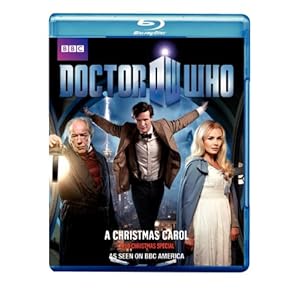
Hey, an episode of Doctor Who actually aired in America on the same day as in England! It's a Christmas miracle! While Russell T. Davies' Who Christmas specials tended to at least acknowledge the existence of the Holiday, they also tended to be about everything except it. Now that Steven Moffat's in charge of the show, he's put the Christmas back in Christmas Special with one of his better episodes, and definitely the most holiday-themed Who I've seen. The episode is obviously a take on a story that's been retold countless times, but Moffat and the cast make it work surprisingly well. Michael Gambon plays a man in control of a planet's dangerous cloud layer who takes family members for collateral on loans, and is very much a future version of Scrooge. Needing his help to save a ship full of people including Amy and Roy, the Doctor takes the role of the various Christmas ghosts and creatively uses the TARDIS to try to change his mind. The time travel twists on the classic story freshen it up quite a bit, and there's a lot here to justify Moffat's conception of the show as fairy tale more than science fiction. A very fun, very British hour of television.
Futurama - "The Futurama Holiday Spectacular"

This special is a lot like the Anthology of Interest episodes from the past, showing three silly short films within the Futurama framework, although this time there's nothing to frame the different stories and everyone dies at the end of all three, making them decidedly out of continuity. They're all based on a different holiday and also have sneaky environmental themes attached, providing a Christmas story about seed contamination, a Robanukah story about the depleting Petroleum reserves, and a Kwanzaa story about honey bees disappearing. It's far from one of the best episodes the show has done, with many of the jokes falling flat and yet another Al Gore appearance feeling a bit redundant at this point, but I'll give it a pass because each segment made me laugh out loud at least once. A bit scattershot, but they were probably constrained by the short running time for each bit, needing to hit multiple themes in each one, and finding a way to kill off the cast at the end each time, so the end result is respectable if not outstanding. A decent hold over until the next season starts.
Robot Chicken - "Robot Chicken: Star Wars Episode III"

There was actually a proper Christmas episode that aired before this, but it appears to be part of the regular fifth season which is starting up soon, while this is definitely a special. While the Family Guy Star Wars tributes have a clear purpose to go on for three episodes, retelling the story of the original trilogy, the Robot Chicken Star Wars episodes have been all over the place with all six movies, making a third seem less necessary. And at an hour long it could have easily dragged. Luckily the writers saved it with a real concept this time, going forward chronologically through the whole series, following Emperor Palpatine's ascent to the throne. It's still just an excuse for a lot of random gags and jokes, but the general progression makes it more interesting than it could have been. Their take on Palpatine is still pretty funny, and a lot of the sketches are among the best and most elaborate they've ever done. It's still definitely just more Robot Chicken in places, but I liked the episode more than I expected.
Tim and Eric Awesome Show, Great Job! - "Chrimbus Special"

The Awesome Show's apparent ending earlier this year was a surprise heartbreak, though they've changed that sentiment in the last couple months with a new tour (that I missed getting to go to), a new hour long episode, and an announcement of a coming movie as well as the possibility of more seasons if they feel like it. That's all great news, and the holiday "Chrimbus" episode was hilarious as expected. Chrimbus is a warped version of Christmas much more focused on the receiving aspect of the holiday than the giving side, and it's an opportunity for more awkward audience reactions, mildly disturbing song and dance numbers, and one off sketches. The episode works as an excuse to bring back all of the old favorite guests, from known celebrities like Zach Galifianakis to fan favorite oddities like Ben Hur. There's a couple more ridiculous Cinco products to throw on the gigantic pile, and a multi-part arc with Carol and Mr. Henderson that wasn't exactly necessary but still pretty outstanding. More fun for Tim and Eric fans, and if it had ended up as the last thing they did, it would have been a nice send off.
Sunday, December 5, 2010
A Bit of Fry & Laurie
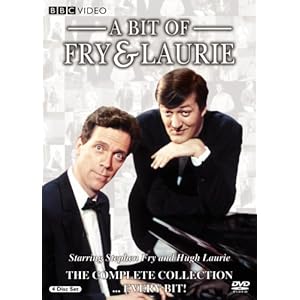
I might have a new favorite ever sketch comedy series. The easy comparison when you look at Fry & Laurie is to the grandfather of British comedy groups, Monty Python. And obviously a show from the 90s won't be as groundbreaking as a similar one from the 70s. But while Monty Python was very important and usually hilarious, it often spent more time trying to be surprising and weird than actually humorous, and that's a way in which Fry & Laurie is superior, because it never sacrifices being funny to make a point or be unique. It has slightly more wit per square inch than Python, which makes it possibly the wittiest thing ever constructed. The jokes often revolve around wordplay, and while sometimes that's not always the cleverest thing, there's just something about the way with language these two guys have that makes every second listening to them speak a delight, and I laughed out loud more frequently than I pretty much do at anything besides the best comedy available.
Stephen Fry and Hugh Laurie make a pretty great team, with Fry often being the more verbose and eccentric one, but Laurie getting plenty of opportunities to be funny as well. A lot of the sketches are based around some unusual way of speaking or a clever and unexpected pun, and they rarely overstay their welcome, not always reaching the most amazing of punchlines but milking the humor while it lasts and then moving on to the next scene. The bits are mostly stand-alone, but there are a few characters who appear repeatedly, and they don't have to resort to the kind of nonsense that most recurring bits on some other sketch shows do. My favorites are probably Control and Tony, a pair of secret intelligence operatives who have a particularly courteous and stilted way of speaking, although John and Peter, a pair of angry business men who keep running progressively worse operations into the ground, are great as well.
Another bit that recurs through the whole series is a string of fake voice-on-the-street segments where Stephen and Hugh dress as people from various walks of life and make humorous comments. These parts evolved over time, at first mostly being non-sequiturs but starting with the third season being filmed a bit differently and more often having fully formed jokes. I honestly kind of preferred the way they started, since it was just a weird way to cleanse the palate before the next sketch. Otherwise the show really doesn't change that much over time, beyond changing the opening and ending sequences with each season, although the fourth did bring a string of special guest appearances that were apparently mandated by the BBC. It could have been an obstacle, but they did a good job of integrating them properly into the sketches and it was almost worth it just because of the overly elaborate and silly introductions they each got from Stephen and Hugh. In the end, they were still the stars, and they put together a wonderful show.
Tuesday, November 30, 2010
MI-5 - Season 4

I thought that the fourth season of MI-5 was a step down from the previous one, although it still had its share of interesting episodes and good moments. I felt like they were turning to the Islamic terrorist angle a bit too often this time, since it often results in some of the least compelling stories the show has to offer, although I'd hesitate to call anything the show has done thus far truly bad. We do get the series' first true two part episode, although honestly I'm not sure the bad guys here actually deserved to see their scheme get carried across nearly two hours. Andy really, they were dipping into spy story cliches a bit too much, with things like an agent's former spouse not being dead after all and a CIA agent orchestrating an attack in England to garner support for an invasion of Iran is about as silly as they've gotten thus far. On the other hand, a lot of the nitty gritty espionage stuff was as cool as ever, and the cliffhanging season finale involving a possible conspiracy around Princess Diana's death and a particularly well equipped nemesis is possibly the most fun I've had with the whole show so far. I've gotten a bit more used to the transience of the cast at this point, and I think it sort of works both for and against the show. The willingness of the writers to write out or even kill off central characters makes the stakes high in every episode and has resulted in some strong drama, but with how frequently it's been happening, it also makes it more difficult to become too attached to a character when you know how easily they could be replaced. It stunts character development just a bit when the people who get the most screen time are the most likely to leave, too. Still, the show has balls, and that's a good thing.
Sunday, November 28, 2010
MI-5 - Season 3

Well, I was hoping that MI-5 would raise the stakes after two mostly predictable (but still good) seasons, and boy did it ever. There was a bit of turnover from season one to two, but what we have here is a massive cast overhaul over the course of the season. All three of what I'd call the main characters leave the show for various reasons by the end, and while it's a bit obvious how their niches in the ensemble are getting replaced by other actors, it was still an impressive showing that the stories in this show are more important than the comfort of seeing the same faces every week. There are still a couple guys who appeared in season one left, but they've definitely established at this point that no one is safe.
And it's not just characters leaving, the stories this season were really damn good as well, several easily among the best in the series. The cliffhanger had much more immediacy than last time, and the whole first episode was dedicated to resolving one of the better schemes the show has cooked up. It also had two outstanding, emotionally powerful episodes back to back dealing with Danny's struggles to commit his first assassination and the political fallout for Zoe of an undercover operation that goes wrong. This is definitely not the typical glamorous pop culture spy life getting depicted here, things get dirty and they're hard on everyone involved. Even more typical missions seemed to have more weight than before, with complex character drama woven in to make the guest stars more than just a recognizable face. I mean, I haven't even been watching the show for that long, but I definitely have more confidence in it making good use of appearances by guys like Gollum and Palpatine going forward than most others. And while the season didn't end with a cliffhanger like the first two times, that's actually a good thing, because the episode itself didn't need it and was again a pretty damn great hour of drama and action. I like this series a lot.
Friday, November 26, 2010
MI-5 - Season 2

MI-5's second season follows essentially the same pattern as the first. A team of British secret agents juggles occasionally dangerous missions, interoffice politics, and personal lives without letting anything get too far away from them, but sometimes things in one of these areas go wrong, and in the season finale, something very dramatic happens. There are some additions to and subtractions from the cast, but the core players are basically the same, with Matthew MacFayden as Tom in the lead role, Danny and Zoe as his support, and Harry as his angry boss. Some of the episodes are a lot more interesting than others, but the general level of quality is fairly consistent. The fifth episode is an interesting departure with its extremely high stakes, although it becomes obvious that things aren't what they seem because a show like this would be excessively unlikely to actually do something like that. Otherwise, the characters take on false identities, covertly monitor communications, undermine conspiracies, and occasionally watch helplessly while very bad things happen. While the off-duty stuff was spread around pretty well in the first season, it's almost all on Tom this time around, as he deals with the aftermath of the first season's cliffhanger, and it builds to a final episode that has him in a ton of hot water. Still waiting to see if the show will ever truly surprise me, but until then, it's a pretty enjoyable spy show.
Tuesday, November 9, 2010
Sherlock - Season 1
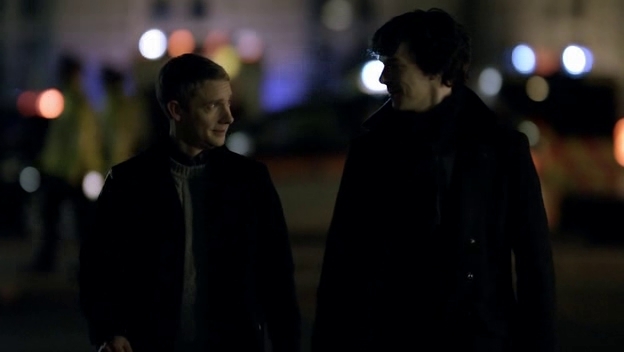
It's apt that this modern day take on Sherlock Holmes was co-created by Steven Moffat, the man currently in charge of Doctor Who. In both, the titular character is a brilliant, fast-talking eccentric who solves mysteries and hangs out with British people. The difference is the Doctor is a time traveling, immortal alien while Holmes is, in his own words, a high-functioning sociopath and the world's only consulting detective. Sherlock is played by Benedict Cumberbatch, a man who is as talented as his name is crazy, and he creates a pretty fascinating, updated take on the classic character. One of Holmes' more interesting characteristics is how he can be a complete master in certain fields of knowledge but absolutely clueless in others, and Cumberbatch takes it to the next level, portraying a real enigma of a man who doesn't really know how to do anything but analyze situations and explain deductions extremely quickly. The always-likable Martin Freeman plays Dr. John Watson, a field medic experiencing adverse effects after what he experienced in Afghanistan. He's set up as Holmes' roommate, and after that the two form an uneasy but persistent friendship as Watson begins accompanying him on cases.
So there's only three episodes to this season, as it really feels more like a trilogy of films more than a TV show. Each episode is about an hour and a half, and tells a full story as the pair solves a case, or to be more accurate, Sherlock solves a case while Watson mostly compliments his brilliance. There's not really much of a chance for a formula to form beyond what I've already said, and it's probably to the show's benefit that the number of cases is so low since it allows each one to be fully fleshed out and intriguing as possible. There's a lot of interesting touches that could have become distracting but instead help serve the modern vibe they're going for, such as a lot of quick cuts and closeups to simulate Holmes' thinking process and popping up text that characters are reading on screens to keep the conveying of information elegant. Unlike some other cop shows, the fun is watching the characters figure things out instead of trying to do it yourself, and none of the plots are as simple as they appear at first. The third and final one re-introduces Sherlock's greatest nemesis in fairly grand fashion and ends on a cliffhanger, an effective way to leave the audience wanting more and assuring them that there will be. I don't know if Freeman's commitment to The Hobbit (which I am in great favor of) will affect the show down the road, but I'm definitely looking forward to seeing what they do.
Tuesday, November 2, 2010
Top Gear - Season 15
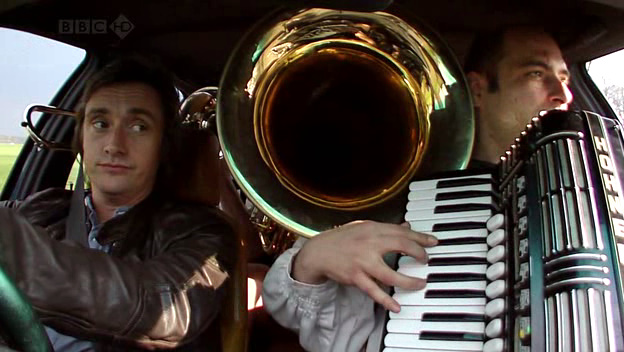
Although the previous season's final episode didn't technically air until last January in Great Britain, it looks like this will unfortunately be the first year to only have one season of Top Gear since 2006. On the bright side, it came over to America after something much closer to a reasonable delay (You might as well air it the next day guys, it's the most pirated show in the world), and for the first time was not edited to a shorter length. There's apparently a new special from the Middle East airing this Christmas that I'm just now hearing about for the first time, but hey, the regular season's over. It was fairly eventful with the inauguration of a new reasonably priced car and a huge bump in the general profile of the special guests, including Rupert Grint from the Harry Potter movies and even big American celebrities like Tom Cruise and the delightful Jeff Goldblum.
But the highlight as always is not the appearances by famous people but the more inspired taped segments. Highlights included Jeremy driving a three-wheeled Reliant Robin in one of the funniest things the show has ever done, and one of the more clever challenges as the three men tried to build their own version of a superior mobile home. Some of these bits are too obviously planned for purely comedic value sometimes, and while it can be more fun when it seems like they're at least trying to make it real like in the races, I appreciate the extent they go to to avoid running out of fun ideas. I'm not sure what's next for the show, or if the American version which is now fully in production will be able to hold a candle. Whatever happens, I hope to spend some more time with these guys.
Friday, October 29, 2010
MI-5 - Season 1

Well this is cool - a spy show that doesn't totally glamorize the profession. I guess you can leave it to the English to do that. If James Bond's MI6 is the globe-trotting foreign intelligence agency like the CIA, then I guess MI5 is the equivalent of the FBI, focused on rooting out operations on British soil. The stakes on the missions are often somewhat low, with some aspect of the intelligence community at stake rather than the world, and the spies aren't superheroes. They live secretive lives outside the job, and sometimes they get killed brutally and unceremoniously. It's a lot different than the standard depiction in the media of this kind of work, and I like it for that.
This show is actually called Spooks in its native Britain, and I kind of like that more than the slightly generic-sounding MI-5. It sets the correct expectations for what the series is. The headquarters aren't terribly high tech beyond a few computers, and the cast is relatively small. It's not about the operations of a whole intelligence force, it's a few people in the spy game. I know Matthew MacFayden from Pillars of the Earth, as the monk in charge of getting the cathedral built. Here he has a mid-level position at the agency, and has to worry about protecting his girlfriend and her daughter from the truth about him. There's a couple younger spooks below him and a couple older ones above him. They deal with things like possible IRA bombing threats and white supremacists trying to start riots on British soil. There's only six episodes in this first season, but they do a good job of establishing the setting for a show that's still running today, with each episode on its own telling an interesting and often quite tense story. The office politics and domestic stuff is surprisingly interesting as well, and I'm definitely looking forward to seeing a lot more.
Sunday, July 25, 2010
Doctor Who - Season 5
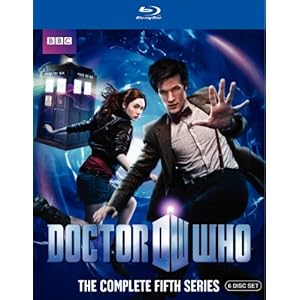
So my favorite Who writer Steven Moffat taking over the show didn't result in a tidal wave of total amazingness, but it was still definitely my favorite run of the show to date. Obviously that praise is a bit limited since I never saw it before the reboot, but it was still pretty darn good. It's greatest strengths were definitely the main cast. Matt Smith is pretty brilliant as the Doctor, maybe not reaching the peak of David Tennant's best moments just yet, but I was sold on him from the opening scene of the season. He manages to pull off some of Tennant's wackier tendencies while also coming close to capturing the gravitas of Christopher Eccleston in his angrier moments, while Tennant had to settle for saying "I'm so sorry" in a monotone. And Karen Gillan (not to be confused with Kieron Gillen) as Amy Pond is my favorite companion of the series as well. She's not exactly the greatest actress, but none of the companions have been, and she combines Martha's easiness to look at with an actual interesting connection to the Doctor that makes her pretty likable. Also, Rorie kicks Mickey's ass as far as companions' boyfriends go.
Since the reboot Who has typically followed a pretty familiar formula, with about ten stories spread over thirteen episodes, mostly watchable on their own but teasing a connective storyline that finally reveals and resolves itself in the finale. Season five doesn't really change this, though it did feel more cohesive as the connections between episodes were more obvious and there was more opportunity for speculation as it was more like a mystery than some loose series of references. I did enjoy said climax as much as any the show has done, though the best stuff was again in some of the episodes preceding. One thing this season did lack was a truly stand-out, completely amazing episode that people will remember for years, but on the other hand there were no heinously terrible ones that people will remember for years for the wrong reason either. It's too bad there was no "Blink" this time, but I think I'd take that trade.
There was the predictable return of classic Who villains like the Daleks, Cybermen, and Moffat's own Weeping Angels, the latter of which I enjoyed quite a bit, though the best stuff tended to be more character focused. The typical meeting-a-long-dead-celebrity episode featured Vincent Van Gogh and was surprisingly good, the one where the gang is stuck between two realities and can't tell which is a dream was quite enjoyable, and the one that's basically a sitcom with the Doctor moving into a London flat was pretty funny even if he seemed just a bit overly oblivious to human behavior. A couple stories, like one in a London that's floating through space and another with vampire-like aliens terrorizing Venice, felt like throwbacks to the show at its most unremarkable, but they were at least competently done. I enjoyed the way they wrapped up the season's arc while leaving tons of possibilities for future adventures, and the set up for this year's Christmas special was pretty great. I figure more time at the helm can only improve Moffat's show running skills, and I'm really excited to see what's next.

































